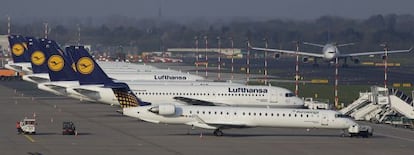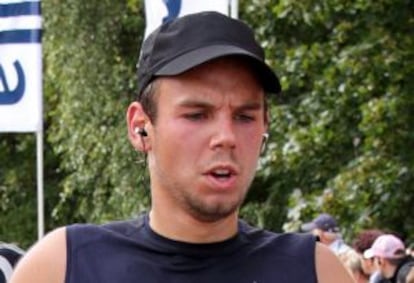Germanwings co-pilot rehearsed how to crash plane on previous flight
Andreas Lubitz programmed the autopilot controls to descend five times on inbound trip

Andreas Lubitz, the co-pilot who is suspected of deliberately crashing a Germanwings plane into the Alps on March 24, killing all 150 people aboard, also carried out a series of strange maneuvers on his previous flight that same morning.
On the incoming journey from Düsseldorf to Barcelona, Lubitz was also alone in the cockpit for several minutes and put the Airbus A320 aircraft on maximum descent on a number of occasions, according to the provisional report released by the French government’s investigation agency on Wednesday.
At 7.20am, air traffic control asked the plane to descend to 35,000 feet; the co-pilot selected 100 feet
The 20-page document states that at 7.19am that morning “noises were recorded that resemble the opening and closing of the cockpit door, which correspond to when the captain left the cockpit.” The aircraft was then traveling at 37,000 feet.
At 7.20am, Bordeaux air traffic control asked the plane to descend to 35,000 feet. However, 18 seconds later, the co-pilot selected an altitude of 100 feet, the lowest one possible. He maintained the setting for three seconds before raising it to the highest allowed – 49,000 feet – before reducing it to 35,000 feet.
At 7.22am Lubitz once again selected an altitude of 100 feet, then changed it several times before settling for a target of 25,000 feet.
At 7.24am, the buzzer calling for the cockpit door to be opened was heard, the door was unlocked, and the captain re-entered. During his absence, Lubitz selected the minimum altitude a total of five times, before rectifying it later.
Initial findings confirm early hypothesis
The investigation’s preliminary findings confirm the initial hypothesis that Lubitz deliberately crashed the plane into the Alps while alone in the cockpit during the flight from Barcelona to Düsseldorf on March 24, ignoring calls to allow the captain back in.

Given that the main goal of an air accident investigation is to prevent the recurrence of similar events, the inquiry will focus on two main areas: monitoring pilots’ health and the cockpit door access system, in place since the 9/11 terrorist attacks.
Investigators underscored that Lubitz had already been forced to interrupt his pilot training between November 2008 and August 2009 for “medical reasons.”
In April 2009 his medical certificate was not renewed on the basis that he was suffering from “depression and had taken medication to treat it.”
The certificate was issued again in July of that year with the proviso that flight doctors had to contact the issuing authority to find out about Lubitz’s medical history before extending any further permissions.
The investigation’s preliminary findings confirm the initial hypothesis that Lubitz deliberately crashed the plane into the Alps while alone inside the cockpit
Lubitz obtained his final medical certificate on July 2014 despite the fact that several reports published after the tragedy noted that he was still taking anti-depressants.
Investigators are now focusing on how a pilot who was intending to crash a plane could have been at the controls despite regulations establishing “mandatory medical criteria for crews, specifically in the areas of psychiatry, psychology and behavioral problems.”
Regarding the cockpit door access, investigators said they would review the entire system. Since the Alps tragedy, several airlines have already told their pilots that more than one person must remain inside the cockpit at all times.
Tu suscripción se está usando en otro dispositivo
¿Quieres añadir otro usuario a tu suscripción?
Si continúas leyendo en este dispositivo, no se podrá leer en el otro.
FlechaTu suscripción se está usando en otro dispositivo y solo puedes acceder a EL PAÍS desde un dispositivo a la vez.
Si quieres compartir tu cuenta, cambia tu suscripción a la modalidad Premium, así podrás añadir otro usuario. Cada uno accederá con su propia cuenta de email, lo que os permitirá personalizar vuestra experiencia en EL PAÍS.
¿Tienes una suscripción de empresa? Accede aquí para contratar más cuentas.
En el caso de no saber quién está usando tu cuenta, te recomendamos cambiar tu contraseña aquí.
Si decides continuar compartiendo tu cuenta, este mensaje se mostrará en tu dispositivo y en el de la otra persona que está usando tu cuenta de forma indefinida, afectando a tu experiencia de lectura. Puedes consultar aquí los términos y condiciones de la suscripción digital.









































